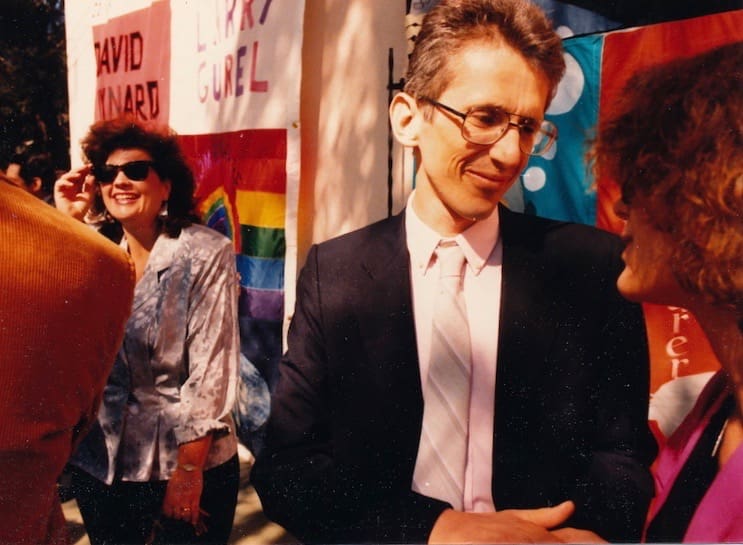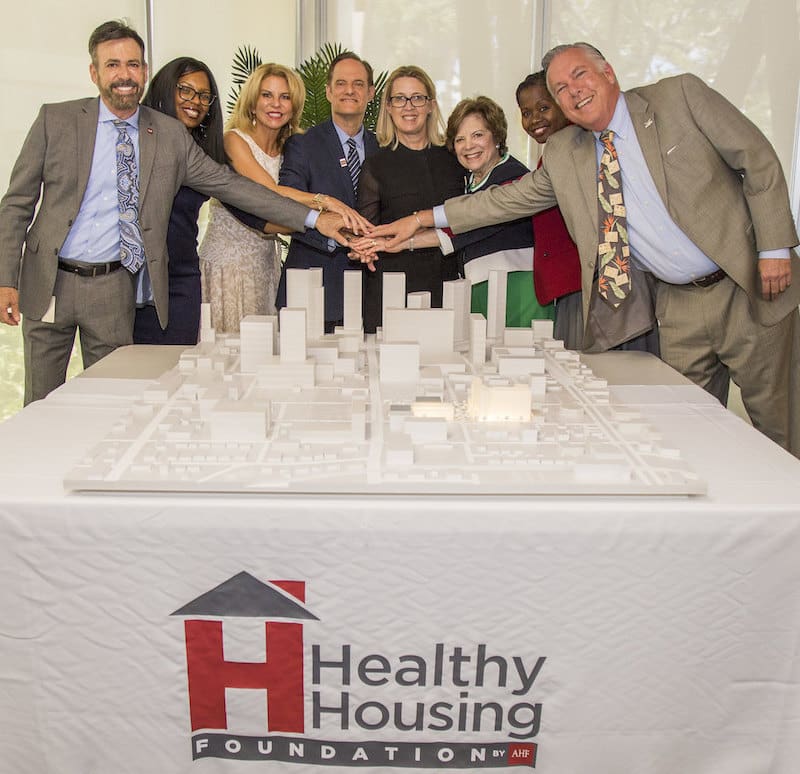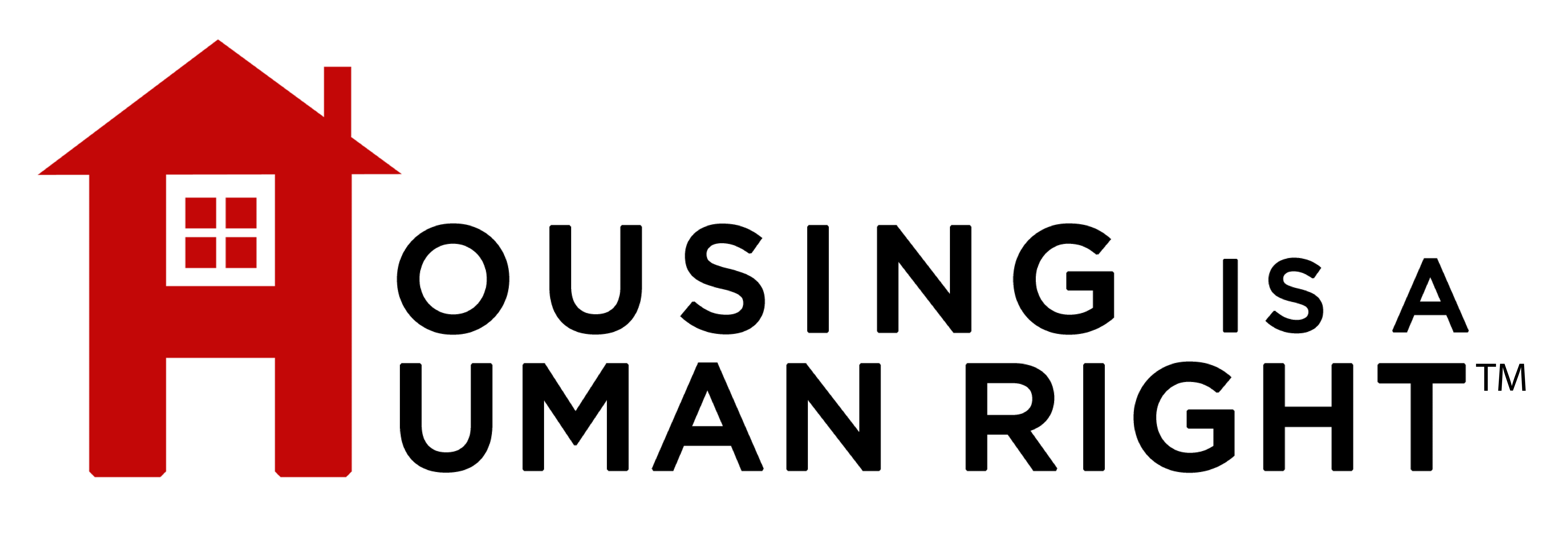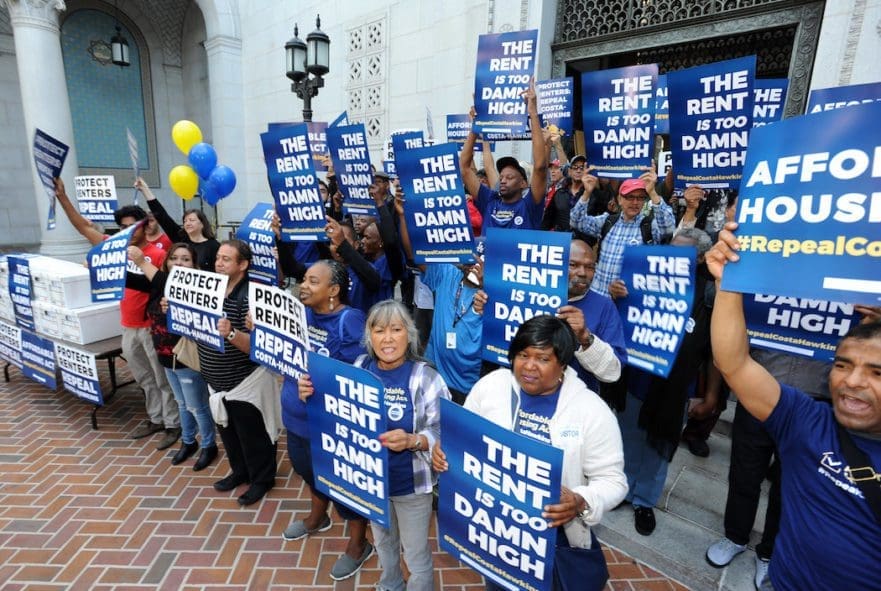For 32 years, AIDS Healthcare Foundation has boldly tackled public health crises — from the AIDS epidemic to sexually transmitted disease outbreaks to the deadly Ebola crisis in Africa. That’s especially true when governments and politicians have failed to act urgently while lower-income populations suffer. The housing affordability crisis, which experts widely consider a serious public health threat, is another instance of AHF stepping up when others have not.
“AHF is a powerful force for good in a society that often overlooks the vulnerable,” Dr. Cornel West, the noted intellectual and political activist, said about the organization.
In 1987, Los Angeles-based AIDS activists Michael Weinstein and Chris Brownlie founded AIDS Hospice Foundation to provide housing and medical services for terminally ill AIDS patients. At the time, people living with AIDS were abandoned by families, treated as lepers at hospitals, and evicted by landlords. They needed a safe, dignified home to live out their final days. AHF opened the Chris Brownlie Hospice in the L.A. neighborhood of Echo Park, down the street from Dodger Stadium.
In the main entrance to the hospice, a sign read: “Gay, Lesbian, Bisexual, Straight, Women, Men, Black, Brown, White, Yellow, Red, Young and Old. All Are Welcome Here.” AHF has carried out that inclusive, patient-centered mission for decades.
In 1992, the organization opened another hospice for Latinos and African Americans living with AIDS in South L.A. In 1996, AHF provided free, life-saving HIV drug treatment to its hospice patients with no reimbursement from government, nearly bankrupting the organization, but saving hundreds of lives. In 2002, despite strong pushback from the South African government, AHF (now known as AIDS Healthcare Foundation) opened its first global clinic in impoverished Umlazi, the third largest township in South Africa where a staggering one in three adults were infected with HIV. Lower-income residents were given free, life-saving HIV drug treatment.
In the years to come, AIDS Healthcare Foundation would bring HIV drug treatment to underserved populations — women, the LGBT community, people of color, intravenous drug users, sex workers — in 43 countries, including the American South, China, Mexico, Uganda, India, Cambodia, and Russia.
“AHF is the last foundation that remains in Russia from abroad,” said Dr. Larissa Badrieva, an HIV/AIDS specialist, in 2014. “AHF is the last piece of serenity, it’s surrounded with wisdom, has the newest scientific technology, knowledge, and information. Nobody would provide this information here if it wasn’t for AHF. Nobody else remains.”
But Chris Brownlie, Weinstein’s best friend and comrade in arms, never saw AHF’s global expansion. He died of AIDS-related complications at the age of 39 in 1989. Weinstein and friends watched Brownlie pass away on his death bed in Los Angeles.
Before Brownlie died, he wrote a column for the local gay and lesbian newspaper. He observed, “I have learned many lessons from the experience of the last years. One lesson is that we will never be given something unless we ask for it. Another is that we have to make it clear that we will fight back when we are denied. Or to put it another way, that we are willing to stand up for ourselves. They can’t treat us like a bunch of sissies. But perhaps the biggest and most astonishing lesson is that if we fight, we can win.”
Those words have guided AHF’s work, especially its advocacy, ever since.

Today, AHF serves 1.1 million patients around the globe. Its longtime mission statement is to provide “cutting-edge medicine and advocacy regardless of ability to pay.”
To do that, AHF utilizes a federal program called 340B, which was signed into law by President George H.W. Bush. It mandates that pharmaceutical companies must give major discounts to eligible healthcare organizations, such as AHF, that buy medications from them. AHF then distributes the drugs to uninsured and insured patients and is allowed to charge a private insurance company or the government the retail cost of the medication. Under 340B, an organization is permitted to keep the difference from the low price paid for the drug and the higher amount reimbursed.
Since the discovery of the AIDS cocktail in 1996, AHF has primarily focused on expanding HIV drug treatment around the world, with the intent of controlling the global spread of HIV. The HIV/AIDS crisis has long been considered a public health crisis, and AHF has seen itself as a public health institution.
It continually works to prevent and treat sexually transmitted diseases such as syphilis and gonorrhea; it demanded that the World Health Organization should respond more quickly and forcefully to address the 2014 Ebola crisis in Africa that took thousands of lives, including an AHF doctor who treated Ebola patients; and it has long sought to lower exorbitant drug prices. AHF, with approval from its board of directors, is now taking on gentrification and the housing affordability crisis as public health issues.
AIDS Healthcare Foundation has seen firsthand that gentrification and the housing affordability crisis have negatively impacted its patients in Los Angeles and San Francisco and in other cities where it operates, such as Seattle, New York, and Washington D.C. As medical experts have noted, people living with chronic diseases need affordable, stable housing to maintain good health.
In Los Angeles, AHF went back to its roots, and became a housing provider in 2017 with the creation of Healthy Housing Foundation and Housing Is A Human Right, the housing advocacy division of AHF. HHF and HHR carry out AHF’s mission of providing “cutting-edge medicine and advocacy.”
Healthy Housing Foundation has repurposed hotels and motels in Downtown Los Angeles, Hollywood, and East Los Angeles, providing hundreds of housing units to lower-income residents. HHF is also planning to build an affordable-housing tower in Fort Lauderdale, Florida, where AHF operates.

In addition, through Housing Is A Human Right, AHF seeks to create policy change and push forward a people-first housing agenda known as the “3 Ps”: protect tenants; preserve communities; and produce housing. The 3 Ps directly confront a profits-over-people, trickle-down housing agenda pushed by the real estate industry and its political allies in government.
“We must urgently address our housing affordability crisis by first helping those in most need,” says Housing Is A Human Right Director René Christian Moya. “That means creating policies and building housing for the middle- and working-class. They are bearing the brunt of excessive, unfair rents and harmful policymaking driven by the real estate industry, which includes corporate landlords and developers.”
Housing Is A Human Right and AIDS Healthcare Foundation have recently launched a new statewide ballot measure, the “Rental Affordability Act,” to bring rent control to California, aiming for the 2020 election. Like in previous battles against powerful forces, AHF expects vigorous opposition from the real estate industry, which spent, in 2018, $77.3 million to stop repeal of statewide rent control restrictions in California. But AHF will follow the guidance of its co-founder, Chris Brownlie: “If we fight, we can win.”

